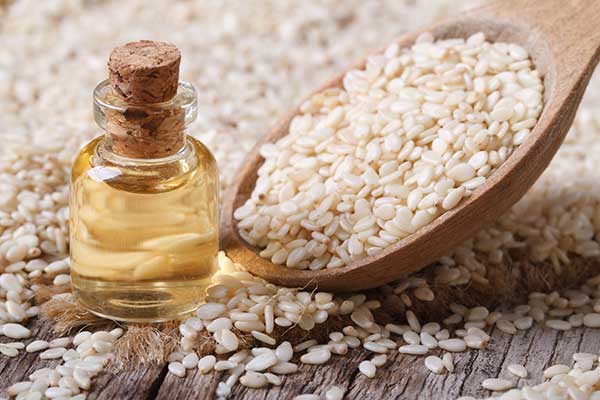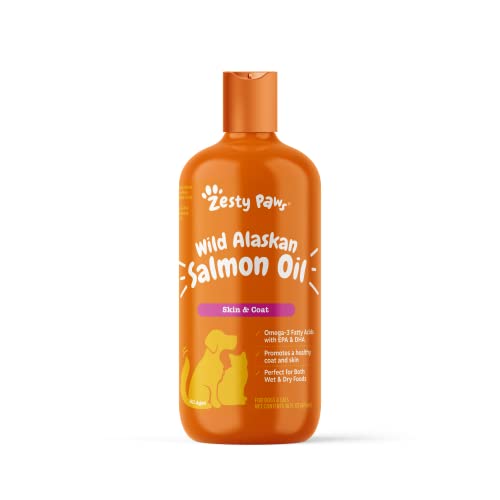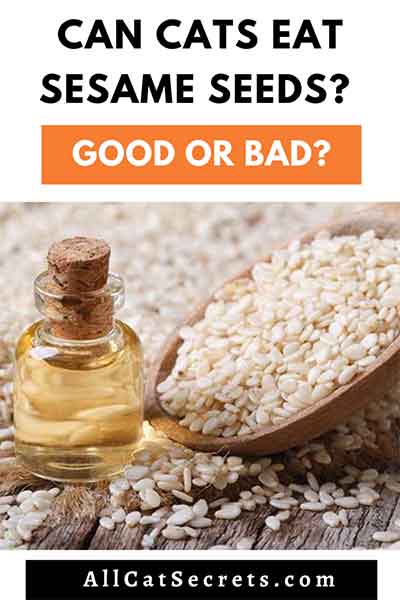Many pet owners already understand what cats should and shouldn’t eat. But we hardly play by the rules all the time.
There will be days when you just feel like sharing your food with your feline friend. On certain occasions, your cat may sneak behind your back and help herself to human food. When that happens, it can leave you with lots of disturbing questions, especially if it’s the first time the cat is snacking on human food.
The good news is that not all people foods are considered toxic for cats. However, you should still consult your vet before introducing your cat to human foods. That’s particularly true for seed-based foods like sesame seeds. Which leads us to the question, can cats eat sesame seeds?
Yes, cats can comfortably eat sesame seeds. Just like sunflower seeds, sesame seeds are unlikely to cause your cat any immediate health concerns. Plus, the seeds come with some health and dietary benefits.
Table of Contents
So, are sesame seeds ok for cats?
As we’ve just indicated, sesame seeds are generally okay for cats. However, the fact that the seeds aren’t toxic to your feline friend doesn’t mean you should readily offer them to her.
As you shall find, sesame seeds carry various inherent risks, especially if you feed them to your cat in excess.
How Might Sesame Seeds Benefit Your Cat?
As a responsible cat owner who also happens to be a lover of sesame seeds, you may find yourself wondering, can cats have sesame seeds?
Although we’ve already mentioned that cats can have sesame seeds, the real question is how the seeds might benefit your feline friend.
For starters, sesame seeds are the tiny, oil-rich seeds that are produced by the Sesamum indicum plant. These seeds come in either their hulled or unhulled forms.
Unhulled sesame seeds are available with their outer, edible husk. On the other hand, hulled sesame seeds come without the outer husk.
Unhulled sesame seeds are distinguished by their golden-brown color, whereas hulled seeds sport an off-white color, which often turns brown upon roasting.
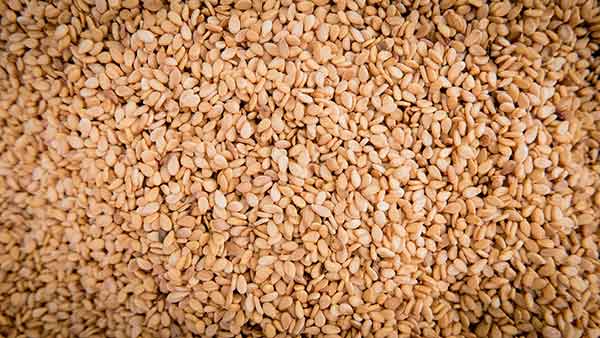
The following are some of the potential health benefits of sesame seeds for your kitto.
1. Great source of fiber
Nearly all plant-based foods are excellent sources of dietary fiber, and sesame seeds are no exception. Unhulled sesame seeds pack more fiber content than their hulled counterparts, with 30 grams of seeds providing as many as 3.5 grams of fiber.
The following are some of the roles that dietary fiber performs in your cat’s body;
i. Nourishing gut-friendly bacteria
Gut-friendly bacteria are the bacteria that reside in your cat’s alimentary canal. By providing these bacteria with their essential nutrients, dietary fiber promotes healthy digestion while reducing the risks of digestive diseases.
ii. Relieve constipation
Dietary fiber, particularly insoluble fiber, passes through your cat’s stomach undigested. As such, it adds bulk to the animal’s stool, which helps to relieve digestive complications like constipation and diarrhea.
iii. Help with weight management
Fiber-rich foods like sesame seeds create a sense of fullness for longer. That makes them excellent at controlling your cat’s food cravings, as well as the quantity of food she can down in one sitting. Which ultimately helps to keep the cat’s weight in check.
- PETKIT Automatic Cat Dog Feeder Dispenser for dog cat Pets
Last update on 2025-04-18 / Affiliate links / Images from Amazon Product Advertising API
2. Lowers the risks of heart disease
Sesame seeds play a role in lowering high cholesterol and triglycerides, which are two major risk factors for heart disease. The seeds are packed with both monounsaturated and polyunsaturated fat, both of which counter the effects of high cholesterol.
A common antioxidant in sesame seeds, known as gamma-tocopherol, has also been shown to help reduce the risks of heart disease. Other cholesterol-lowering compounds in sesame seeds include lignans and phytosterols.
Sesame seeds also lower the risks of heart disease by regulating blood pressure. The seeds are abundant in essential minerals like magnesium, vitamin E, and lignans. These compounds work synergistically to prevent the buildup of plaque in your cat’s blood vessels, thereby regulating her blood pressure.
Also Read: Can Cats Eat Pumpkin Seeds? How Can They Benefit From The Seeds?
3. Lowers the risks of inflammatory conditions
Sesame seeds are rich in copper, which can decrease pain and inflammation. Therefore, these seeds might help to keep your cat safe from inflammatory conditions like cancer.
Copper also plays a role in strengthening your cat’s joints and blood vessels. Other chronic conditions you can prevent by feeding sesame seeds to your cat include obesity, diabetes, and kidney disease.
4. Promotes healthy bones
Sesame seeds are loaded with minerals that promote healthy bones, including calcium, magnesium, manganese, and zinc. Feeding your feline friend sesame seeds once in a while may help to prevent degenerative bone diseases like osteoporosis.
However, note that these seeds also contain compounds that may inhibit the absorption of essential minerals. Some of those compounds include phytates and oxalates.
Thankfully, you can reduce the effects of these antinutrients by soaking sesame seeds before offering them to your feline friend.
Evidently, there are numerous ways your cat can benefit from snacking on sesame seeds. But the question remains, are sesame seeds good for cats?
The following section highlights some of the possible adverse effects of sesame seeds. You can then compare the health benefits against the side effects and determine whether you should offer sesame seeds to your kitto or not.
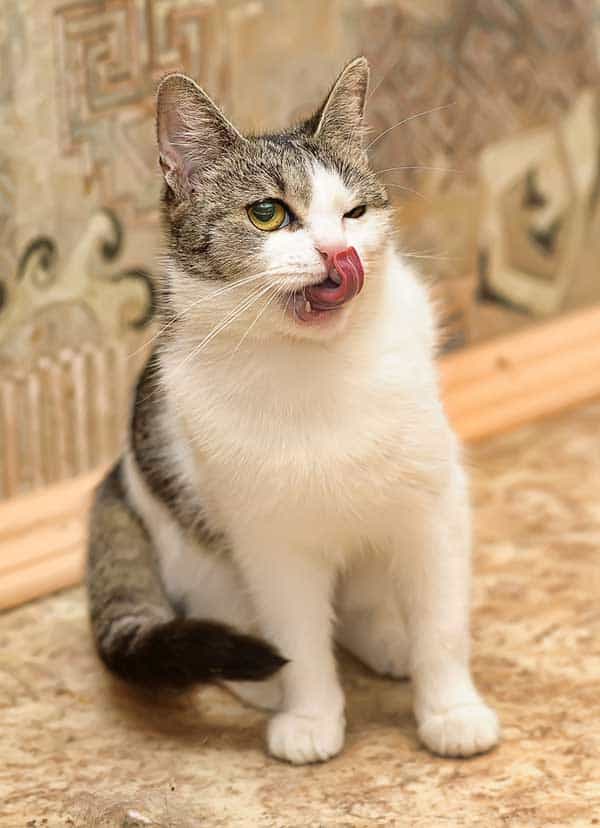
Side Effects of Sesame Seeds for Cats
Are sesame seeds safe for cats? As it turns out, sesame seeds do not present any immediate risks to your feline friend. But as a responsible and caring cat owner, there are still some risks to watch out for.
The following are some of the things that could go wrong if your cats eat sesame seeds;
1. Choking risks
Sesame seeds are relatively small. That should come as good news for cats who generally don’t chew their food properly.
However, the tiny-sized seeds can also get stuck between your cat’s teeth and cause her discomfort. In addition to causing discomfort, the seeds may also offer a breeding ground for bacteria, leading to tooth decay and other oral problems.
The easiest way out of this problem would be to examine your kitto’s teeth and possibly brush them each time she has eaten sesame seeds. And you’ll be lucky to get away without a few bites.
2. Possible toxicity
We’ve already indicated that sesame seeds aren’t toxic on their own. However, these seeds are rarely consumed as standalone meals.
In most cases, they’re combined with baked goods, condiments, spices and other products that are considered toxic for cats.
If you’re purchasing readymade sesame seeds for your cat, examine the ingredients used carefully and ensure that they’re all for her consumption.
- Goes Great with Any Meal - For pet parents looking for an alternative to capsules, raw treats, or soft chews, all it takes is a...
- A tasty & body nourishing treat for cats & dogs - Essential fatty acids for a healthy coat.
- Powerful Omega Fatty Acids - This premium fish oil liquid formula is loaded with the healthy Omega-3 fatty acid (with EPA and DHA)...
Last update on 2025-04-18 / Affiliate links / Images from Amazon Product Advertising API
3. Not very nutritious for cats
Although sesame seeds come with a cocktail of health benefits, your cat may not enjoy all of those benefits. That’s because cats are typically obligate carnivores.
As obligate carnivores, cats derive all of their nutritional needs from animal protein. Their bodies aren’t designed to process plant matter, and that may make it difficult for them to benefit from sesame seeds’ dense nutritional profile.
What’s The Best Way to Offer Sesame Seeds to Cats?
Sesame seeds come in different forms, including raw, roasted, boiled, and even sesame oil. Shun raw sesame seeds and only feed your cat cooked seeds. And note that the best way to cook sesame seeds for cats is by roasting them.
Roasting may denature some of the nutritional elements in sesame seeds. But your cat will find it easier to chew the roasted seeds. Plus, roasting helps to inhibit the effects of antinutrients which could otherwise interfere with the absorption of essential minerals from the seeds.
However, ensure that you roast the seeds plain, without adding salt, spices, or fats.
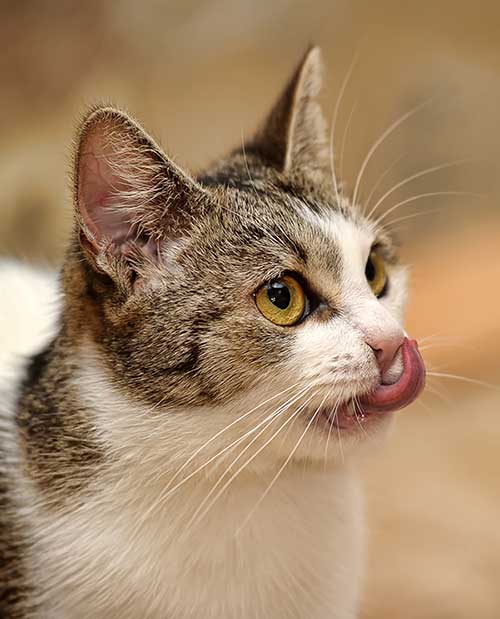
What of sesame seed oil, is sesame seed oil safe for cats?
It’s not unusual to come across cat owners wondering, is sesame oil okay for cats?
Yes, sesame seed oil is just as safe for cats as sesame seeds are. In small amounts, sesame seed oil might help to relieve indigestion and rejuvenate your cat’s coat. You only need to offer the oil to your kitto in moderation.
There’s also the question of sesame seed sticks. But can cats eat sesame seed sticks? Again, the answer is a resounding yes. However, check the sticks to ensure that they’re not formulated with any food ingredients that are toxic to cats.
Conclusion
Sesame seeds are safe and healthy for cats. However, only offer your feline friend sesame seeds in moderation. Remember that all said and done, your cat is an obligate carnivore and will do just fine on a diet of animal protein.
Checkout Our Favorite Cat Products
1. Best Online Course For Cat Parents
Our favorite: The Cat Language Bible (How to Finally Understand And Speak to Your Cat) – A new form of cat to human communication that many cat owners have dreamed about… but few have actually thought possible.
2. Best Immune Support For Cats
Our favorite: Tomlyn Immune Support – Best Supplement for Cats and Kittens.
3. Best Cat Treats
Our favorites: LIFE ESSENTIALS All Natural Freeze Dried Chicken And Sheba Meaty Tender Sticks – Both are Great.

